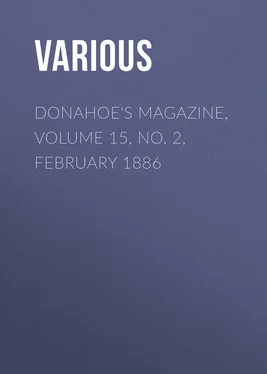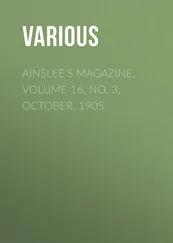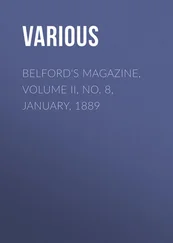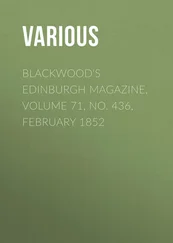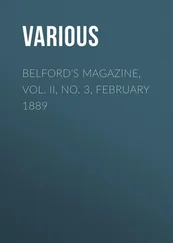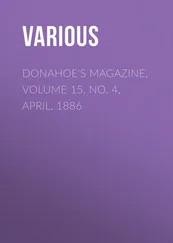Various - Donahoe's Magazine, Volume 15, No. 2, February 1886
Здесь есть возможность читать онлайн «Various - Donahoe's Magazine, Volume 15, No. 2, February 1886» — ознакомительный отрывок электронной книги совершенно бесплатно, а после прочтения отрывка купить полную версию. В некоторых случаях можно слушать аудио, скачать через торрент в формате fb2 и присутствует краткое содержание. Издательство: Иностранный паблик, Жанр: foreign_edu, periodic, на английском языке. Описание произведения, (предисловие) а так же отзывы посетителей доступны на портале библиотеки ЛибКат.
- Название:Donahoe's Magazine, Volume 15, No. 2, February 1886
- Автор:
- Издательство:Иностранный паблик
- Жанр:
- Год:неизвестен
- ISBN:нет данных
- Рейтинг книги:4 / 5. Голосов: 1
-
Избранное:Добавить в избранное
- Отзывы:
-
Ваша оценка:
- 80
- 1
- 2
- 3
- 4
- 5
Donahoe's Magazine, Volume 15, No. 2, February 1886: краткое содержание, описание и аннотация
Предлагаем к чтению аннотацию, описание, краткое содержание или предисловие (зависит от того, что написал сам автор книги «Donahoe's Magazine, Volume 15, No. 2, February 1886»). Если вы не нашли необходимую информацию о книге — напишите в комментариях, мы постараемся отыскать её.
Donahoe's Magazine, Volume 15, No. 2, February 1886 — читать онлайн ознакомительный отрывок
Ниже представлен текст книги, разбитый по страницам. Система сохранения места последней прочитанной страницы, позволяет с удобством читать онлайн бесплатно книгу «Donahoe's Magazine, Volume 15, No. 2, February 1886», без необходимости каждый раз заново искать на чём Вы остановились. Поставьте закладку, и сможете в любой момент перейти на страницу, на которой закончили чтение.
Интервал:
Закладка:
Yes, loved but not remembered thou shalt be—
The absent only may remembrance claim—
But in my kingdom thou shalt dwell with me,
Companion of my glory as my shame.
Amen, amen, I say to thee that thou,
Ere yet another day illume the skies,
With crown unlike to this that binds my brow
Shalt share the glories of my paradise.
The Celt in America
It is the common delusion of our day that Americans as a people are of Anglo-Saxon lineage. This has been said and reiterated, until it descends into the lowest depths of sycophancy and utter folly. It is false in fact, for above all other claimants, that of the Celt is by far the best. Glancing back to our primeval history, we find the Kelt to be the centre-figure of its legends and traditions. We are told by an old chronicle, that Brendan, an Irishman, discovered this continent about 550 A. D., and named it Irland-Kir-Mikla, or Great Eire; this is corroborated by the Scandinavians. Iceland was settled in the sixth century by Irish, and when the Norsemen settled there, they found the remains of an Irish civilization in churches, ruins, crosses and urns: thus, it is not at all improbable that the Celts of those islands sent out exploring parties who discovered for the first time the American continent. Passing over the myths and legends of that curious and quaint era, let us read the pages of authentic American history.
On that memorable October day, when the caravels of Columbus came to anchor in the New World, the Celt acted well his part in that great drama. He who first reached land, from the ships of Columbus, was a Patrick Maguiras, an Irishman. Columbus in his second voyage had on board an Irish priest, Father Boyle, and several of his crew were Celts. In the early discoveries and settlements the Kelt was ever in the van of the pioneers of Western civilization; he explored rivers, bays, and forests, while the Anglo-Saxon scarce tread on American soil until the close of the sixteenth century. The first gateway to civilization for the West, was made by priests from France, among whom were many Irish missionaries, who were forced to fly their native land and seek shelter elsewhere. St. Augustine and New Mexico were founded by the Spaniards long before a cabin was built in Jamestown, and the Spanish and French sovereigns ruled numerous flourishing dependencies in the New World ere the English Pilgrims had seen Plymouth. The Anglo-Saxons, then, were not so forward in explorations and discoveries as their neighbors, the Celts and Latins. Review the epoch of the colonial development, and we find that the Celt surpasses the Saxon.
The Huguenots fled from France; the Scotchman left his native heather to escape despotism; the Irishman exiled from his patrimony sought a home in the American wilds. Many a Spaniard made his Nova Iberia in the South, and the log-cabins of the French pioneers dotted the north-western wilderness. The Swedes founded Delaware, and New York was created by the stolid Dutch. The Moravians and the Welsh came hither likewise; the Puritans fled Merry England and Quakers sought religious freedom in America; but the great body of the English people believing in the State and the religion of their sovereign, had no desire to risk fortune here, especially when the laws were made for their benefit even if at the expense of the colonists. Thus, with exceptions of the Quaker and the Puritan, some few Cavaliers and the paupers, the great body of the Anglo-Saxon people remained at home. In American colonization, Anglo-Saxonism was but a drop in the bucket. Among all the famous thirteen colonies there was not one settled by Saxons exclusively; and in all of the colonies the Celt predominated. The Puritans when they founded Massachusetts, rigorously excluded all who differed from them; nevertheless the Celt waxed strong in New England. "It was," says Hawthorne, "no uncommon thing in those days to see an advertisement in the colonial paper, of the arrival of fresh Irish slaves and potatoes." Bunker Hill itself was named after a knoll in county Antrim. Faneuil Hall was the gift of a Celt, and the plan of it was drawn by Berkeley, the Irish philosopher, who said prophetically,
"Westward the course of empire takes its way;
The four first acts already past,
A fifth shall close the drama with the day;
Time's noblest empire is the last."
The Boston Irish Charitable Society was organized near a century and a half ago, and the first paper mill in Massachusetts was built by a Celt named Thomas Smith. The names of Belfast, Londonderry, Ulster, Sullivan and Bangor show the nationality of their settlers. The founders of the Empire State were Teutons; but when it passed to the English realm, James II. sent over as Governor, Colonel Dongan, an Irishman. This Governor during his term of office, brought over large numbers of Irish emigrants. Pennsylvania was the most Keltic of the colonies. The first daily paper in the United States was founded by John Dunlap, an Irishman. So great was Celtic emigration to this State that in one year (1729) there came to Pennsylvania no fewer than 6,208 persons, of whom 242 were Germans, 247 English, and 5,653 Irishmen. So numerous were Celts that Washington once said, "Put me in Rockbridge County, and I'll find men enough to save the Revolution." In Maryland it was the same. The first ship that sailed into Baltimore was Irish, though the figure-head, Cecil Calvert, was English; but the town from which he derived his title, and after which the metropolis of Maryland is named, is in Galway, Ireland. In the Old Dominion, the first settlers were in good part English. The Scotch and Welsh were very powerful, and the Irish were very numerous. The impress if the Celts in Virginia is seen in Carroll and Logan counties, Lynchburg, Burkesville, Brucktown and Wheeling.
In 1652, Cromwell recommended that Irishwomen be sold to merchants, and shipped to New England and Virginia, there to be sold as wives to the colonists. A manuscript of Dr. Lingard's puts the number sold, at about 60,000; Brondin, a contemporary, places the number at 100,000. The names of these women have become anglicized, for the English law forbade the Irish to have an Irish name, and commanded them to assume English names. North Carolina was settled mainly by the Scotch and Welsh, with English and Irish additions. So was Georgia. In South Carolina the Irish predominated. "Of all the countries," says the historian of South Carolina, "none has furnished this province with so many inhabitants as Ireland. Scarce a ship leaves any of its ports for Charleston that is not crowded with men, women, and children." So much for the so-called English colonies. Among the foremost of distinguished men in the colonial times were the Celts. The first man elected to an office, not appointed by the Crown, was James Moore, Governor of North Carolina. James Logan, the successor of Penn, and William Thompson, were both Celts. Let us glance at the Revolution; it is in this struggle that the Celt was covered with glory; and either on the field or in the forum he was always in the van. The Celts of Mecklenburg made a declaration of freedom over a year before the Declaration of Independence was made.
Thomas Jefferson, the author of the Declaration of Independence, was of Welsh ancestry, and thus a Celt. John Hancock inherited Celtic blood from his mother, Nora O'Flaherty. Behold the array of Celts who signed the Declaration in 1776: Carroll, Thornton, McKean, Rutledge, Lewis, Hart, Lynch, Jefferson and Reed. A merchant of Philadelphia, John Nixon, first read to the people that immortal paper. Charles Thompson, Thomas McHenry and Patrick Henry, the Demosthenes of the Revolution, were Celts. The poetry of the loyal English writers afford abundant proof of the influence and numbers of the Celts in those days. The first blow for Independence was struck by James Sullivan of New Hampshire, and the first blow on sea was struck by Jeremiah O'Brien, of Machias, Maine. A Celt, Thomas Cargill, of Ballyshannon, saved the records of Concord when the British soldiery went out from Boston to destroy the military stores in Middlesex. Nor was it in the opening scenes alone that the Celts were prominent; but from the death of McClary on Bunker Hill, to the close of the war, they fought with a vigor and bravery unsurpassed. Who charged through the snowdrifts around Quebec but Montgomery, a Celt.
Читать дальшеИнтервал:
Закладка:
Похожие книги на «Donahoe's Magazine, Volume 15, No. 2, February 1886»
Представляем Вашему вниманию похожие книги на «Donahoe's Magazine, Volume 15, No. 2, February 1886» списком для выбора. Мы отобрали схожую по названию и смыслу литературу в надежде предоставить читателям больше вариантов отыскать новые, интересные, ещё непрочитанные произведения.
Обсуждение, отзывы о книге «Donahoe's Magazine, Volume 15, No. 2, February 1886» и просто собственные мнения читателей. Оставьте ваши комментарии, напишите, что Вы думаете о произведении, его смысле или главных героях. Укажите что конкретно понравилось, а что нет, и почему Вы так считаете.
